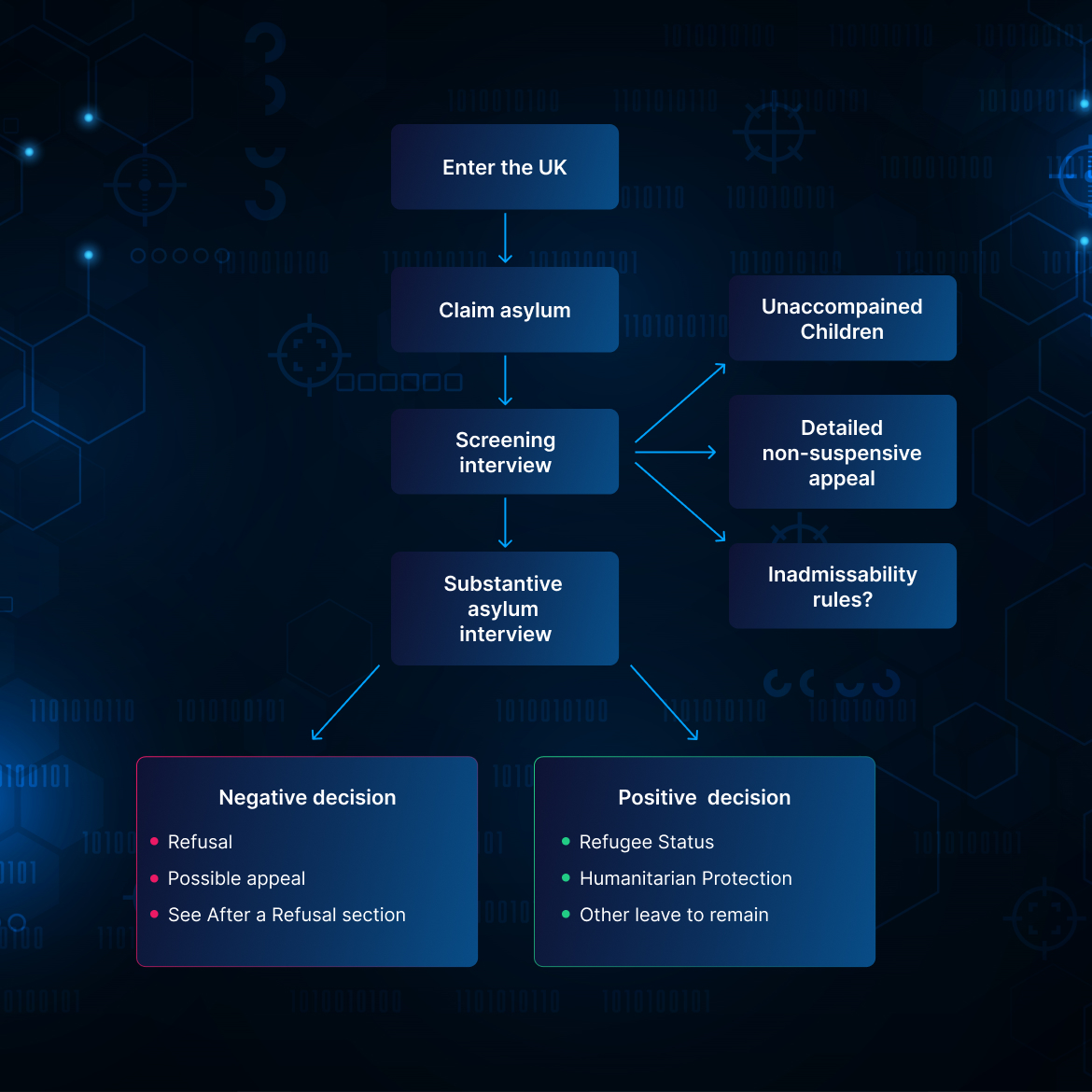Asylum in UK
At Human Rights Lawyer, we specialize in helping individuals seeking asylum in the UK. Navigating the UK’s asylum process can be complex, and our experienced team is here to assist with preparing your application, gathering necessary documentation, and representing you before the relevant authorities.
At Human Rights Lawyer, we specialize in helping individuals seeking asylum in the UK. Navigating the UK asylum process can be complex, and our experienced team is here to assist with preparing your application, gathering the necessary documentation, and representing you before the relevant authorities.
To remain in the UK as a refugee, an asylum seeker must prove that he or she can’t live safely in any part of their home country due to fear of persecution. If you’re stateless, this applies to the country where you usually reside.
This persecution must be due to your race, religion, nationality, political opinion, or other factors like gender, gender identity, or sexual orientation, influenced by the social, cultural, religious, or political situation in your country. Additionally, you must have been unable to obtain protection from authorities in your country.
When your claim might not be considered
Your asylum claim may not be considered in the UK if you:
– Are from an EU country.
– Traveled to the UK via a ‘safe third country’.
– Have ties to a safe third country where you could seek asylum.
A ‘safe third country’ is typically one where:
– You’re not a citizen.
– You wouldn’t face harm.
– You wouldn’t be sent to another country where you could face harm.
Asylum Statistics in UK
Asylum applications
In 2002, the UK received 84,132 asylum applications, but the number dropped to a 20-year low of 17,916 in 2010. From 2021, there was a significant increase, reaching 81,130 applications in 2022, the highest since 2002. These applications involved 99,939 individuals. The COVID-19 pandemic reduced air route arrivals in 2020 and 2021, while small boat arrivals, including asylum seekers, increased. In 2022, small boat arrivals continued to rise, even with other travel routes reopening.
Proportion of all migrants who are asylum seekers and refugees
In 2019, asylum seekers accounted for about 6% of UK immigrants. In 2020, during lower overall immigration due to the pandemic, this proportion may have been around 12%. In 2022, asylum seekers and refugees constituted roughly 21% of immigrants, including those under Ukraine and Afghan resettlement schemes, small boats arrivals, resettled individuals, and family reunion visas (approximately 264,000 people). If the British National (Overseas) scheme is included as a humanitarian route, this category would represent up to 26% of immigration that year.
Decisions and refusals
The initial asylum refusal rate peaked at 88% in 2004 but has since decreased, reaching 24% in 2022, the lowest since 1990. From 2004 to 2021, about 75% of initial asylum refusals led to appeals, with nearly one-third of those appeals being successful.
Nationality of asylum seekers and refugees
In 2021, 42% of the asylum applicants were from the Middle East, and 23% were from Africa. In 2022, the largest groups were from Asia (32%) and Europe (25%).
Between 2014 and June 2023, 51,000 people resettled in the UK through various schemes. This included 20,000 Syrians under the Vulnerable Persons Resettlement Scheme from 2014 to 2020 and 21,500 Afghans from 2021.
In 2022, new routes were introduced for Ukrainians, and by June 2023, around 179,000 people had arrived and were granted refugee status. This exceeded any previous forced migration flow to the UK, equivalent to the total number of refugees granted refuge in the UK from all origins between 2014 and 2021.
What benefits do people seeking asylum get?
People seeking Asylum in the UK rely on government support while awaiting their application outcome. This support includes housing and a small allowance for essentials, starting from the screening.
Housing is provided, but the location isn’t chosen by asylum seekers. The weekly allowance for necessities is £5.84 per day, with additional support for pregnant women and mothers with infants. Children aged 5-17 can attend state school for free.
However, asylum support was designed as a short-term solution, which often becomes much longer due to extended waiting times.
How and where to claim asylum
Some individuals claim asylum upon arrival in the UK at ports such as airports, and train stations, or upon reaching the UK by sea. They inform immigration officials of their asylum claim and typically undergo a screening interview to collect basic information about their journey shortly thereafter.
If you don’t claim asylum immediately upon entering the UK, you must register your asylum claim by scheduling an appointment at the Asylum Screening Unit (ASU) in Croydon, also known as the Asylum Intake Unit. This applies to both adults and children. To make an appointment, contact the Asylum Intake Unit Appointments Line at:
Telephone: 0300 123 4193
Operating hours:
– Monday to Thursday: 9.00 am to 4.45 pm
– Friday: 9.00 am to 4.30 pm
For unaccompanied children, the welfare interview should be conducted locally instead of requiring travel to Croydon if it’s not the nearest Home Office branch. If you are an unaccompanied minor (under 18) or work with them, refer to our Young Asylum Guide for information on the asylum process for young people.

What is the asylum process in UK?
After claiming asylum, you will undergo a brief initial interview known as the Screening Interview, where basic information will be collected.
After your initial asylum interview, you will receive an Application Registration Card (ARC), an identity card with your photo that confirms your asylum claim. Learn more about ARC cards on the Home Office website.
Following the screening interview, you will undergo the substantive asylum interview where you must explain the reasons for your asylum claim. The waiting time between the screening and substantive interviews can vary significantly, ranging from several months to over a year.
After your Substantive Interview, the Home Office will assess your asylum claim and decide whether to grant you refugee status. The waiting period for this decision can be long, causing distress. If your claim is accepted, you will receive refugee status, possibly categorized as Group 1 or Group 2, or another immigration status.
Finding an immigration or asylum lawyer is currently challenging due to COVID-19 lockdown backlogs, the Afghanistan crisis, the Ukraine war, and post-Brexit immigration status for EEA (EU) nationals. However, you can always contact our asylum lawyers for consultation, assistance, or advice on obtaining asylum in the UK: via messenger or by mail or our contact form. We offer comprehensive support, including accompanying you to all authorities and providing expert legal advice throughout the procedure.

Asylum in UK FAQ
According to the Refugee Convention of 1951, a refugee is anyone who is forced to leave his or her country to escape war, violence, or persecution. Refugees have a well-founded fear of violence and persecution for reasons like religion, race, nationality, and political opinion.
Despite challenges, most asylum claims succeed. In the year ending June 2022, 76% of initial decisions granted asylum or humanitarian protection. However, the Home Office can take months or years to decide on asylum application cases, leading to a growing backlog.
You can stay in the UK for 5 years with 'leave to remain' and apply for settlement or further leave when it expires. If you can't return to another country due to persecution, claim asylum first and apply for asylum online.
Asylum seekers in the UK are generally not allowed to work while their claim is processed. Instead, they receive accommodation and financial support for essential living needs to prevent destitution.
According to the 2023 Illegal Migration Act, your asylum application will be rejected if you enter the UK illegally and fail to declare your refugee status at the point of entry. The Illegal Migration Act was enacted to speed up the removal of people immigrating to the UK illegally.
On December 21, 2022, the High Court ordered Home Secretary Suella Braverman to increase Asylum seekers' financial support by 60 pence per day, raising it from £40.85 to £45 per week.
After your asylum claim is refused, the Home Office will send you a letter instructing you to leave the UK. If you are single with no dependent children, the support from the Home Office will cease 21 days after your asylum claim is fully refused.

